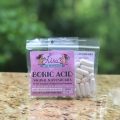Heartburn, also known as acid reflux, is a common digestive disorder that causes a burning sensation in the chest and throat. It occurs when stomach acid flows back into the esophagus, leading to discomfort and irritation.
Heartburn is characterized by a burning sensation or discomfort in the chest and throat. It is primarily caused by the reflux of stomach acid into the esophagus, which is the tube that connects the throat to the stomach. The medical term for heartburn is gastroesophageal reflux disease (GERD).
Heartburn symptoms can vary in intensity and may include:
- Burning sensation: A burning feeling in the chest, often behind the breastbone, that may radiate up to the throat.
- Acidic taste: A sour or acidic taste in the mouth, especially when bending over or lying down.
- Regurgitation: The backflow of stomach acid or food into the mouth, often accompanied by a bitter or sour taste.
- Chest pain: Chest discomfort that may be mistaken for a heart attack, especially if it occurs after a meal or while lying down.
- Difficulty swallowing: A feeling of food getting stuck in the throat or a sensation of tightness.
Heartburn is primarily caused by the malfunctioning of the lower esophageal sphincter (LES), a ring of muscle that acts as a valve between the stomach and the esophagus. When the LES weakens or relaxes inappropriately, it allows stomach acid to flow back into the esophagus, leading to irritation and inflammation. Common causes and contributing factors of heartburn include:
- Certain foods and beverages: Spicy foods, fatty or fried foods, citrus fruits, tomatoes, chocolate, caffeine, alcohol, and carbonated beverages are known to trigger heartburn in susceptible individuals.
- Overeating: Consuming large meals or overeating can increase the pressure on the stomach, causing acid reflux.
- Obesity: Excess weight, particularly around the abdomen, can put pressure on the stomach and promote the backflow of acid into the esophagus.
- Pregnancy: Hormonal changes and increased pressure on the abdomen during pregnancy can contribute to heartburn.
- Hiatal hernia: This occurs when a portion of the stomach protrudes into the chest through the diaphragm, affecting the normal functioning of the LES.
- Medications: Certain medications, such as nonsteroidal anti-inflammatory drugs (NSAIDs), aspirin, and some blood pressure medications, may relax the LES or irritate the esophagus, leading to heartburn.
While there are numerous remedies available to combat heartburn, one time-honored and widely practiced method is drinking milk. In this article, we will delve into the various ways milk can help alleviate heartburn symptoms and provide relief. So, let’s explore the ten ways milk aids in combating heartburn.
- Neutralizes Stomach Acid: Milk possesses alkaline properties, which can help neutralize excess stomach acid that contributes to heartburn. By reducing the acidity, milk acts as a natural antacid, providing temporary relief from the burning sensation and discomfort.
- Soothes the Esophagus: When heartburn strikes, the lining of the esophagus can become irritated. The coolness and smoothness of milk help soothe the inflamed esophagus, providing a soothing and calming effect on the affected area.
- Forms a Protective Coating: Drinking milk creates a thin, protective layer over the lining of the esophagus, acting as a barrier against stomach acid. This protective coating helps reduce the intensity of heartburn and protects the esophagus from further irritation.
- Calcium Content: Milk is a rich source of calcium, which plays a vital role in regulating the muscular contractions of the digestive tract. Calcium helps strengthen the lower esophageal sphincter (LES), the muscle responsible for preventing stomach acid from flowing back into the esophagus. A stronger LES helps prevent the occurrence of acid reflux and reduces the severity of heartburn symptoms.
- Protein Content: The high protein content in milk promotes the release of the hormone cholecystokinin (CCK), which aids in digestion by promoting the emptying of the stomach contents into the small intestine. By facilitating efficient digestion, milk can help reduce the likelihood of heartburn occurring.
- Cooling Effect: The coolness of milk can provide instant relief from the burning sensation caused by heartburn. This cooling effect can help calm the inflammation in the esophagus and provide a refreshing sensation, easing the discomfort associated with acid reflux.
- Hydration: Milk is primarily composed of water, making it an effective hydrating beverage. Adequate hydration is crucial for maintaining proper digestion and preventing heartburn. Drinking milk helps keep the body hydrated, ensuring the smooth flow of food through the digestive system and minimizing the chances of acid reflux.
- Fat Content: While high-fat foods can trigger heartburn for some individuals, low-fat milk or skim milk can be beneficial. Consuming low-fat milk helps avoid excessive fat intake, which can stimulate the production of stomach acid. Therefore, opting for low-fat milk can be a wise choice for those prone to heartburn.
- Psychological Relief: Heartburn can cause significant discomfort, both physically and psychologically. The act of sipping a warm glass of milk can provide a psychological relief, helping to reduce stress and anxiety associated with heartburn. This relaxation can indirectly alleviate heartburn symptoms and promote overall well-being.
- Versatility: Milk can be consumed in various forms, such as plain milk, warm milk, or in combination with other ingredients. Some people find relief by adding honey or a pinch of turmeric to a glass of warm milk. These variations make milk a versatile remedy that can be customized to suit individual preferences and provide relief from heartburn.
Conclusion
Milk has long been recognized as a natural remedy for heartburn, offering multiple ways to combat acid reflux and provide relief. From neutralizing stomach acid to soothing the esophagus and forming a protective coating, the properties of milk make it a go-to option for those seeking relief from heartburn symptoms. Additionally, the calcium and protein content, cooling effect, hydration, and psychological relief further contribute to milk’s efficacy in alleviating heartburn. However, it’s important to note that milk may not work for everyone, and individual responses may vary. If heartburn symptoms persist or worsen, it is advisable to consult a healthcare professional for further evaluation and guidance. Also Read: Benefits of Fura Da Nono






